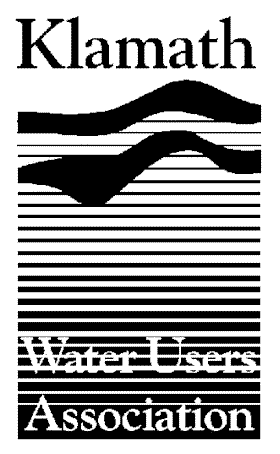
Klamath Water Users Association
Address to Public Information Meeting
Dan Keppen, Executive Director
April 7, 2004 Klamath County Fairgrounds
|
|
Klamath Water Users Association Address to Public Information Meeting Dan Keppen, Executive Director April 7, 2004 Klamath County Fairgrounds
|
|
Thank you all for coming tonight. I’d especially like to thank the Fairgrounds staff and Bob Gasser, of Basin Fertilizer, for setting up the facilities tonight. We will attempt to keep the water user presentations as brief as possible this evening, in order to provide as much time as possible for Reclamation and OWRD to answer your questions. And that will also apply to me. I often find myself agreeing with what Mark Twain once said – "I cannot keep from talking, even at the risk of being instructive." However, I intend to honor our commitment tonight to try to keep individual water user presentations as concise as possible. Tonight you will hear summary updates on what our association is doing in the legal, scientific, power and public relations arenas. We have also sponsored this evening’s meeting with the chance of providing you with an opportunity to see, first hand, how the Klamath Project 2004 Operations Plan looks. Normally at this time of the year, KWUA holds its annual meeting. This year – which marks our 50th anniversary – we are planning on holding the annual meeting in July, to accommodate a special guest speaker. Last year, White House environmental advisor David Anderson was our featured speaker, and the year before, we hosted John Keys, the Commissioner of the U.S. Bureau of Reclamation. You can expect another high profile guest at July’s event. For the first time in the 30 months that I have been with KWUA, I am feeling optimistic about the outlook for the Klamath Project and the future of the entire watershed. This community played an amazing role in focusing national attention on the 2001 water crisis, and because of that, we are currently seeing unprecedented political and media attention. While this has both positive and negative consequences, I’ll try to focus on some of the positive things we are seeing, and are promoting as an organization:
This finding validates what local water users have said for the last decade: you are not going to solve the fishery challenges of the Klamath River watershed by focusing solely on the 2% of the land that comprises the Klamath Project.
We are hopeful that all of these activities will contribute to revised, sound management plans that contribute to reliable Klamath Project water supplies and affordable Project power. With that said, I would like to now introduce Dave Solem, general manager of Klamath Irrigation District, Past President of KWUA, and Chair of our association’s legal and science committees, to kick off the first of three committee reports. II. WRAP-UP Thank you, gentlemen, for your reports. We have many others to thank this evening, and I would especially like to acknowledge the leadership and support shown by our elected officials. We can all thank the Bush Administration for having the courage and commitment to tackle this very contentious issue. I am puzzled by anti-farming interests and critics of the Administration who claim that this administration discards sound science for politics. What we’ve seen here in the past two years defies these flawed claims. The Bush Administration in 2001 was literally handed biological opinions that shut down our family farms. In order to sort things out, the Secretary of Interior later in the year asked the premier independent science body in the land to assess what happened and to provide long-term recommendations. With recommendations in hand, the Administration put its money where its mouth was and, in the FY 2005 budget request, asked for $105 million to tackle programs throughout the watershed, consistent with the NRC Committee findings. So – tell me again - what’s wrong with this approach? The answer is – nothing. It’s how you manage business using a watershed-wide approach. There are many other people to thank for these positive developments. We all know what Rep. Greg Walden has done for us – his efforts cannot be over emphasized. We have also gotten tremendous support from Senator Gordon Smith, and our friends on the California side of the Project, Reps. Wally Herger and John Doolittle. We have a much-improved, healthy relationship with Senator Wyden and his staff. Governor Kulongoski has clearly demonstrated to us that he understands the importance of our farming community to the state of Oregon. The advisors surrounding Governor Schwarzenegger also appear to be very solution-oriented and averse to finger-pointing. We have had three face-to-face meetings with the new California secretary of resources this year alone. We thank Senator Steve Harper for following through with commitments he made in Salem to protect Klamath Project irrigators and irrigation districts. The county commissioners from Klamath, Siskiyou and Modoc Counties deserve recognition for their continued support of Project water users. Finally, thank you to Klamath County Sheriff Tim Evinger, a steady supporter of Project agriculture, who has played an important role in developing our excellent relationship with Governor Kulongoski’s office. Our effort - to develop solutions designed to comply with federal requirements, while enabling farmers to continue to farm and to continue to support wetlands and wildlife - is a delicately balanced activity. I hope that you will appreciate the volunteer efforts of community leaders that have dedicated their time to our association to work on your behalf towards this end. I would now like to introduce Barry Norris of the Oregon Water Resources Department, who traveled down from Salem to be with us tonight. |
|
Klamath Water Users
Association |
Content and Logo: Copyright © Klamath
Water Users Association, 2002 All Rights
Reserved
Page design: Copyright ©
klamathbasincrisis.org, 2002, All Rights
Reserved